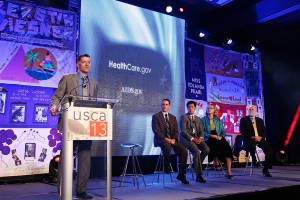U.S. Conference on AIDS 2013 – Highlights from Day 1
Topics
 The annual U.S. Conference on AIDS (USCA) opened yesterday, Sunday, September 8, 2013 in New Orleans. Organized by the National Minority AIDS CouncilExit Disclaimer (NMAC), the conference has drawn more than 1,700 stakeholders from all fronts of the HIV/AIDS epidemic—from case managers and physicians, to public health workers and advocates, people living with HIV/AIDS, and policymakers – for four days of information sharing. Among the highlights of the first day of the conference were two plenary sessions.
The annual U.S. Conference on AIDS (USCA) opened yesterday, Sunday, September 8, 2013 in New Orleans. Organized by the National Minority AIDS CouncilExit Disclaimer (NMAC), the conference has drawn more than 1,700 stakeholders from all fronts of the HIV/AIDS epidemic—from case managers and physicians, to public health workers and advocates, people living with HIV/AIDS, and policymakers – for four days of information sharing. Among the highlights of the first day of the conference were two plenary sessions.Federal Perspectives on the Affordable Care Act
HIV.gov coordinated a plenary that focused specifically on how implementation of the Affordable Care Act is supporting efforts to improve HIV prevention, care, and treatment and achieve the goals of the National HIV/AIDS Strategy. Introducing the session, NMAC’s Executive Director, Mr. Paul Kawata, observed that “when we join the Affordable Care Act with the science of ‘treatment as prevention’ and the National HIV/AIDS Strategy, we have a combination that can begin to end this epidemic.”The session featured HIV leaders from several federal agencies. During their presentations, each shared observations about aspects of Affordable Care Act that are making a critical difference in their work on behalf of people at risk for or living with HIV. These included:
- Dr. Grant Colfax, Director of the White House Office of National AIDS Policy (ONAP), pointed to the vital role that the Affordable Care Act has in national efforts to achieve the goals of the National HIV/AIDS Strategy and, in particular, improve outcomes all along the HIV care continuum which the President has recently called federal agencies and other stakeholders to focus on more intently as they continue to implement the Strategy.
- The health care law’s provisions requiring coverage by most private health insurance plans without co-pays or deductibles for many preventive services—especially HIV testing and behavioral counseling to reduce risk for sexually transmitted infections and HIV—were cited as particularly significant by Dr. Johnathan Mermin, Director of CDC’s National Center for HIV/AIDS, Viral Hepatitis, STD, and TB Prevention.
- Dr. Laura Cheever, Associate Administrator of the Health Resources and Services Administration for the HIV/AIDS Bureau, pointed to two provisions of the health care law that will substantially aid in delivering care to people living with HIV/AIDS (PLWH/A). First, the law’s provisions that give states the option to expand Medicaid to PLWH without having to qualify as ‘disabled’ as currently required. Given the relatively low income of the majority of uninsured PLWH who currently receive services under the Ryan White HIV/AIDS Program, they would be eligible for Medicaid coverage under the law if their state chooses to expand it, she explained. This would provide them with access to a broader array of health care services than the Ryan White program can cover. Second, Dr. Cheever pointed to the fact that the health care law prohibits insurers from denying coverage to people with pre-existing conditions, including HIV/AIDS. This will expand the availability of health coverage for people with HIV.
- Observing that the Centers for Medicare and Medicaid Services (CMS) is collaborating more closely than ever before with its federal partners for a unified vision and approach to HIV issues, Dr. Stephen Cha, the Chief Medical Officer for CMS, observed that the Affordable Care Act is much more than about getting more people health coverage. He emphasized that its true promise lies in leveraging the foundation of that coverage and combining it with the successes of the Ryan White HIV/AIDS Program and others to fundamentally improve way we are providing care to change course of the HIV epidemic in the United States. He shared that, toward this end, CMS is exercising various authorities to foster healthcare delivery reform and offer states new flexibilities.